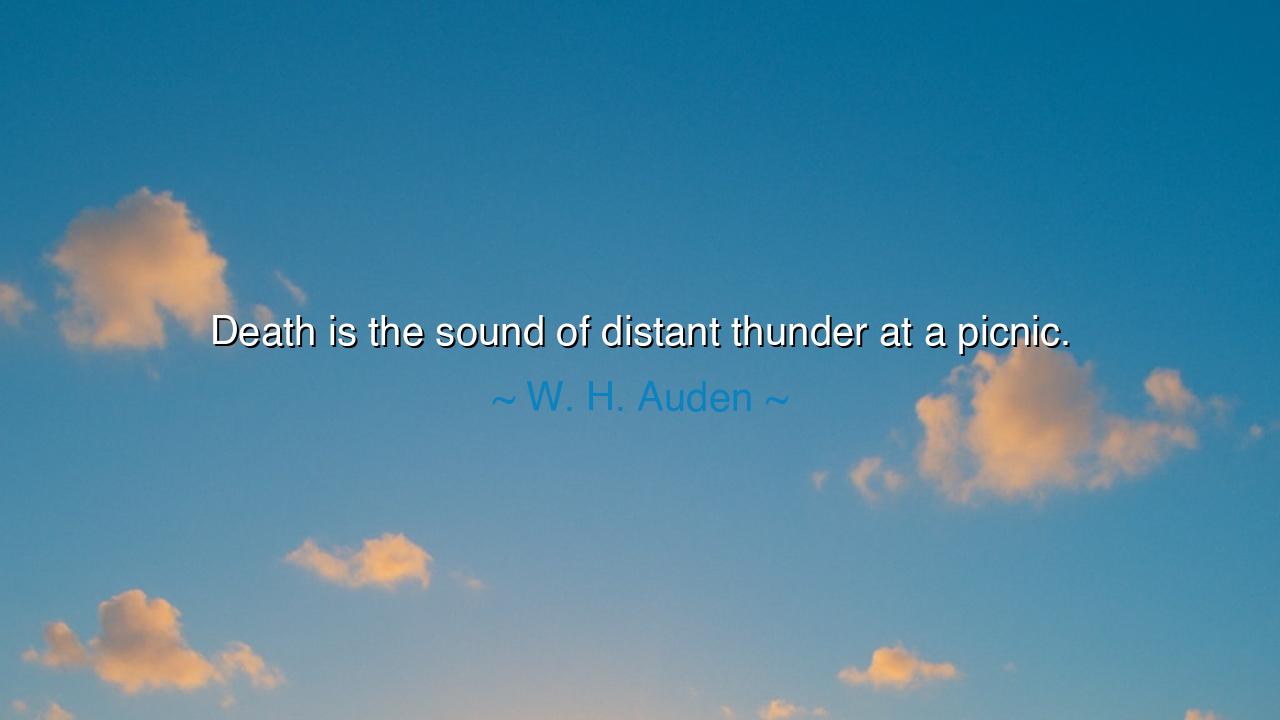
Death is the sound of distant thunder at a picnic.






The poet W. H. Auden, with words subtle as smoke and heavy as prophecy, once wrote, “Death is the sound of distant thunder at a picnic.” In this image, simple yet profound, he captures the fragile balance between life’s joys and the shadow that forever waits at its edge. The picnic—that symbol of warmth, laughter, and sunlight—stands for all the fleeting happiness of our mortal days. The distant thunder—low, rumbling, inevitable—reminds us that even in the midst of joy, death murmurs beyond the hills. We may feast beneath the open sky, but the storm is always somewhere in the world, slowly rolling nearer.
Auden’s words were not born of despair, but of clarity. He lived in an age when the thunder was not metaphor but real: the roar of warplanes, the rumble of bombs, the collapse of cities during the Second World War. He saw humanity trying to dance while the heavens growled above them. The poet understood that life persists even under the shadow of doom—that men fall in love, sing songs, and drink wine, even as death gathers on the horizon. The thunder does not end the picnic immediately—it warns us, awakens us, makes the laughter sweeter for being brief. Auden’s wisdom lies in that paradox: to live fully, one must first accept how fleeting life truly is.
In the days of ancient Rome, during the great feasts of triumph, a slave would whisper to the victorious general, “Remember, you are mortal.” Amidst the glory and the cheering crowds, that voice was the distant thunder—a soft reminder that every crown fades, every banquet ends. The Romans, who knew well the fragility of fortune, did not seek to banish death from their minds; they invited it as a teacher. To forget death is to live shallowly, as if the sky could never darken. But to remember it—to hear the low thunder in the distance—is to live deeply, gratefully, awake.
Consider also the tale of Anne Frank, a young girl whose diary became one of the most human testaments of her time. While hidden from the world, surrounded by the thunder of war and persecution, she still wrote of the beauty of the sky, of hope, of love. Her words were written at the world’s most tragic picnic—a brief, fragile celebration of life under the shadow of certain death. Yet she smiled toward the light. From her, we learn that acknowledging mortality does not extinguish joy—it sharpens it, purifies it, and makes each moment radiant.
So, too, in our modern age, when comfort dulls our senses and noise fills our minds, we must still learn to listen for that distant thunder. Not in fear, but in awareness. For when we know the fragility of life, we cherish it more dearly. The laughter around the picnic cloth becomes more sacred, the touch of a friend’s hand more precious, the taste of bread and wine more divine. The presence of death, unseen but certain, gives meaning to every breath we take.
Let no man or woman turn away from the thought of death, for it is not an enemy but a mirror. It reflects the measure of our gratitude, our love, and our courage. When we live as though the day will last forever, we live thoughtlessly. But when we live with the knowledge that the thunder approaches, we begin to love as if time itself were on fire. To live well is not to banish death’s shadow, but to dance while it watches, to smile while the wind grows restless, to be alive in full defiance of the storm.
And so, my children of tomorrow, learn this lesson: do not flee the sound of thunder, for it is the heartbeat of eternity reminding you that you are alive now. Live as those who know the storm is coming, but who choose still to sing. Speak kind words before silence claims you. Hold those you love before the night descends. For one day, when the clouds break and the storm rolls overhead, you will have no regret—only the peace of one who knew that life was a picnic under a trembling sky, and that even distant thunder could not still the joy of your song.






AAdministratorAdministrator
Welcome, honored guests. Please leave a comment, we will respond soon